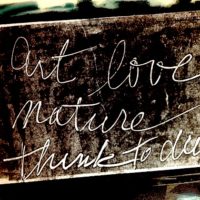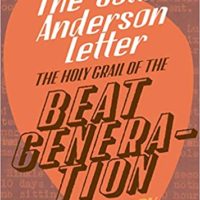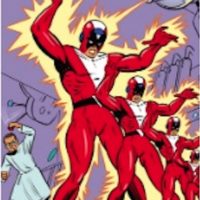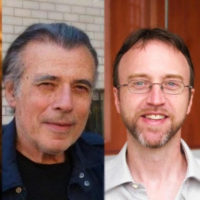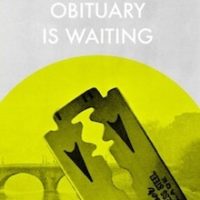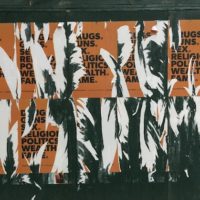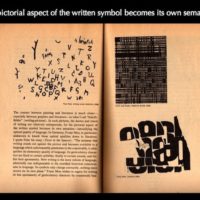It was a getaway / from the concrete city. / No bears alas / no porcupines alas / no mosquitos / no lyme-tick bites / one little fruit tree / knocked down by the wind / now gone alas / bears liked its berries / no deer alas
except one on the road / and there I was / alone alas. — jh
At the Gravesite = Small Animals
Cold Turkey Press sees it this way for a card to be published in a limited edition.
GC CUNY at the Center of the Conversation
Peter Baker & Susan Glasser on James A. Baker III, with Kai Bird
“For a quarter-century, from the end of Watergate to the aftermath of the Cold War, no Republican won the presidency without the help of James A. Baker III or ran the White House without his advice. Now two major political journalists, Peter Baker (of The New York Times) and Susan Glasser (of The New Yorker) have written ‘The Man Who Ran Washington,’ a definitive, page-turning biography of the power broker whose impact was unmatched when Washington ran the world and who influenced America’s destiny for generations. The authors join in a discussion with Kai Bird, executive director of the Leon Levy Center for Biography.”
The Holy Grail of the Beat Generation
Neal Cassady: ‘The Joan Anderson Letter’
When Jack Kerouac read Neal Cassady’s spontaneous rush of words, he claimed it was more alive than any piece of writing he had ever seen. In its effusive style, its freewheeling candor, its Proustian (yes, Proustian!) introspection, the letter touched off a response in Kerouac that reshaped entirely his own approach to writing. The result was an explosion of “road” novels, beginning with “On the Road,” in which Cassady is renamed Dean Moriarity and seen as nothing less than “the root, the soul” of Beat legend.
GC CUNY at the Center of the Conversation
The Science of Superheroes
FREE ONLINE EVENT: “The pop-culture universe of superheroes is filled with extraordinary humans and abilities. Captain America, the Hulk, and Black Panther seem to lie firmly in the realm of fantasy, but the technology behind them might not be as farfetched as we think. In his book ‘The Science of Marvel,’ Sebastian Alvarado shows that, using quantum physics, evolutionary biology, and mechanical engineering, we can find real-world parallels to superpowers such as ‘spidey sense’ and Thor’s lightning. He speaks with Shane Campbell-Staton, host of the podcast ‘The Biology of Superheroes,’ about where the science meets the fiction.” — GC Presents
Free Online Event / Friday / Oct. 30 / 12 p.m.
Bend Your Mind: Artificial Intelligence and Art
“Today’s computers compose music that sounds “more Bach than Bach” and turn photographs into paintings in the style of Van Gogh’s “Starry Night.” They also write screenplays. But are algorithms truly creative—or are they merely tools to be used by musicians, artists, and writers?” — Creative GC: Art and Science Connect
This Side of Grub Street
Readers wanted to know all about their celebrities, or at least about my encounters with them. From A-listers and B-listers right down to Z-listers. The whole stupid alphabet top to bottom. Names to be forgotten one day. They needed the publicity and I needed the job. I wasn’t a star fucker—I’ll say that, having come from the newsroom with no more interest in celebrities than any routine reporter. I was a stand-in for star fuckers.
Genes of Irish Genius in ‘Blooming Molly Malone’
A friend writes: A little re-Joyceing in this wee lonesome blooming Molly Malone. You can hear the genes of Irish genius in the DNABC of this little clamourer. You feel she’s on the verge of channelling Beckett, Behan, O’Casey, O’Brien, Yeats et al, at any moment. A true antidote to popery and nunnery, and the cold, cold kiss of Covid. A little four-leaf clover complaining from beneath the cloven hoof of parental devilry. She must have been fed Guinness in the womb, there’s so much blarney in her tongue. Man, you feel she possesses such alchemical witchery, she could eat Covid, and shit it out the other end as an emerald. A rare little island of hope.
For Carl Weissner’s Would-Be 80th
Coming on June 16th: “Death in Marseille,” the last words of Arthur Rimbaud as imagined by Carl Weissner. To be published in a limited handmade edition designed by Gerard Bellaart, and translated and edited from the German by Keith Seward & Jan Herman.
Memento Mori
snow again today / and the wind / came like a freight train / then blue sky
On Zen Arse-Wiping in the Shitstorm
A friend writes from Scotland: “As to Zen arse-wipes. While I was up in a Zen temple in the mountains around Takayama, it fell to me to be the one who had to clean the shit off the wooden slipway that carried the fecal prayers of monks into a dark and forbidding hole (not unlike […]
TLS Review: Brion Gysin Let the Mice In (and More)
‘Brion Gysin Let the Mice In’ is a key collaborative work. it represents those late 1950s to early 1960s years when Beat writing met European experimentalism. The most sophisticated intelligence of the Beat Generation was permanently affect.
Gysin is a lucid and witty writer. He gives glimpses of Burroughs at the moment when ‘Naked Lunch’ was being edited for Olympia Press — as he “ranted through the gargantuan roles of Doc Benway, A.J., Clem & Jody,” or as a drug addict, “through the shadows from one pharmacia to another, hugging a bottle of paregoric … his raincoat glinting like the underbelly of a shark.”
It’s That Time of Year . . .
. . . when it seems that everybody is looking back over their shoulder more with nostalgia than disgust. I am not immune. Scrolling through some old emails, I came across this one called “from NELSON ALGREN’S LETTERS TO RAJAH.” Rajah was Roger Groening, a friend of Nelson’s and later of mine. Roger died in 2015. I think of him often. He and Nelson became friends, initially by mail, when Roger wrote him a fan letter. They remained friends for some 20 years until Nelson’s death, in 1981.
Do Brits Love Obituaries or Poetry—or What?
Hard to believe, but there it is, Your Obituary Is Waiting, listed at #10 this morning in Amazon UK’s top-seller ranking of obituary books. Which goes to show that Amazon’s rankings are, among other things, ridiculous. My “deformed sonnets” are poems not obituaries. But if British readers don’t complain, why should I? The book is also listed at #272 in its “American poetry” ranking. Which might indicate that Amazon UK hasn’t gone totally nuts—except that when I consider the lack of sales of even one copy of the book in either category both lists make as much sense as Donald Trump.
Drugs. Guns. Sex. Religion. Politics. Wealth. Fame.
It’s hard to believe that whoever pasted up these posters did not also rip them up. Hats off to the artist. Found dé-collage in midtown Manhattan. Photographed on the northwest corner of East 47th Street and Third Avenue.
Poetry Beyond Words
Words are at the heart and soul of poetry . . . They give a poem shape & substance. . . . So what is poetry beyond words?
‘If I Die Ahead of Time . . .
Nelson Algren died 38 years ago today. The staff here hasn’t forgot. Hi, Nelson.

